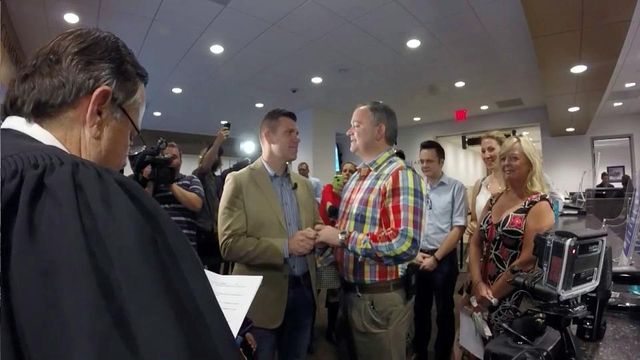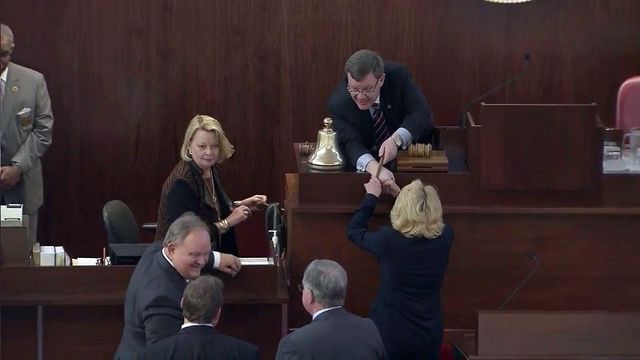'Religious freedom' bill filed amid protest
The first Senate bill filed Wednesday would allow magistrates and employees of county registers of deeds offices to refuse to perform marriages or issue licenses due to religious objections. Some Democratic lawmakers and gay rights advocates say it would legitimize discrimination.
Posted — UpdatedThe bill also states that magistrates' duty to perform marriages is to be considered collectively as an office, not a duty of an individual magistrate.
The proposal was filed in response to the resignation of several magistrates around the state who objected to marrying same-sex couples after a federal judge threw out North Carolina's constitutional ban on same-sex marriage and ordered the state to treat same-sex couples equally. One of those magistrates was in Berger's Rockingham County district.
The legislation would allow those magistrates to seek reappointment. It would also protect any religious objector from any disciplinary or legal action.
Senate Bill 2 would require that a county's elected register of deeds ensure that marriage licenses are issued to all legal applicants, and if no magistrate is available to perform a ceremony, the chief District Court judge would have to ask the state Administrative Office of the Courts to send in a magistrate to perform ceremonies.
A magistrate would have to be available to perform marriages for 10 hours, spread out over three business days, per week. In the interim, the judge would serve as magistrate.
“This bill offers a reasonable solution to protect the First Amendment rights of magistrates and register of deeds employees while complying with the marriage law ordered by the courts – so they are not forced to abandon their religious beliefs to save their jobs,” Berger said in a statement.
At a press conference Wednesday morning, Democratic lawmakers and advocates for gay and lesbian North Carolinians said such a proposal would allow public servants sworn to uphold the Constitution to decide which parts they wish to uphold.
"In this nation, we as citizens do not have to pass any government employee's personal religious test in order to receive a government service," said Sen. Jeff Jackson, D-Mecklenburg. "Whether it's a prosecutor policeman, magistrate or mailman, government offices that are open to the public must be open to everyone on the same terms."
As a former prosecutor, Jackson said he didn't have the right to decide whether or not to prosecute based on his religious beliefs, "and I think most Americans want to keep it that way."
Sen. Erica Smith-Ingram, D-Northampton, said lawmakers need to focus on boosting North Carolina's economy, not social issues.
"I am unwavering in my support of religious freedom, but this is not about religious freedom," Smith-Ingram said of Berger's bill. "Let’s bring the focus back to what really matters to the people of north Carolina. We need more jobs. We need a stronger education and stronger funding for education."
Rep. Grier Martin, D-Wake, said Berger's proposal would send the wrong message to businesses with gay and lesbian employees, especially in the technology and military sectors.
"If they see that a state is trying to discriminate against their employees, they are less likely to bring jobs here," Martin said.
Similar legislation has been vetoed or defeated in other Republican states.
House Speaker Pro Tem Paul Stam has said he intends to file a more sweeping religious objector legislation, and he said he doesn't expect any negative economic impact from it.
"The business community has not said that. That would be an incoherent statement if the business community were to say that, that protecting religious liberties somehow hurts business," Stam said.
House Speaker Tim Moore said two weeks ago when he was sworn in that he would focus on jobs during this session, and he reiterated that Wednesday.
"We have a diverse caucus, and other folks have other interests they want to pursue," Moore said. "So, we'll go through the caucus and whatever the majority wants to do, we'll do."
Gavels galore in House
Leaders in the House and the Senate spent brief sessions Wednesday naming committee members and passing out gavels to committee chairmen. Chairmanships are much sought after because they help lawmakers raise money from advocacy groups that want certain legislation passed or stopped, and the position can also help a lawmaker bring home projects or funding for his or her district.
Moore spread the wealth, handing out close to 100 gavels. Almost every committee has several chairs and vice chairs – and there are 37 committees.
"We have a lot of talent. We have a very large sophomore class. We have a very large, I guess, third-term class. Those folks have really stepped up, and we wanted to make sure they had the opportunity to chair committees," he said.
More Democrats are vice chairs in the House this year than during the last session, something that Moore negotiated with House Minority Leader Larry Hall.
Berger also named more committee chairs this year that in the past, but no Democratic senators were given a leadership position in any Senate committee.
The House and the Senate likely won't conduct much business until next week, but they did pass resolutions Wednesday inviting Gov. Pat McCrory to deliver his State of the State address on Feb. 4.
Related Topics
• Credits
Copyright 2024 by Capitol Broadcasting Company. All rights reserved. This material may not be published, broadcast, rewritten or redistributed.






